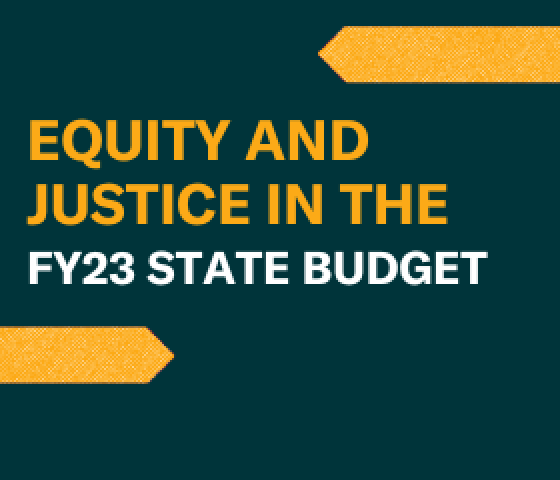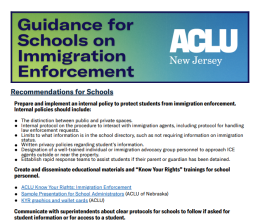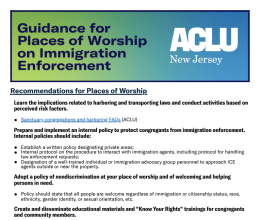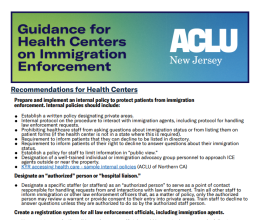Amid years of economic hardships exacerbated by the pandemic, New Jersey collected more tax revenue than it anticipated. More than anything, this tax revenue highlights the economic improvement of those who are already wealthy, while those in greatest need are still suffering.
Our surplus makes it even more essential for the budget to reflect urgent equity priorities, especially as the majority of New Jerseyans struggle amid record levels of inflation and a historic shortage of affordable housing.
A state's budget reflects our values and priorities. Several key budget items with justice at the center — including housing assistance, expansion of aid to people excluded from federal COVID-19 relief, legal representation for immigrants in detention, and community reinvestment from cannabis revenue — must top the agenda. We need to make our voices heard and tell our lawmakers how urgently we need a budget that puts justice at the fore.
Assisting Those Excluded from Federal Pandemic Aid
Programs created during the pandemic made an enormous impact in addressing issues that demanded attention from the state long before COVID-19 began, and we must continue to build upon those initiatives.
During the pandemic, Gov. Murphy allocated $40 million in relief for communities excluded from federal COVID-19 aid , but, as advocates have urged to the Legislature, we need far more funding to provide equitable relief for those who need it. With $1 billion, the state can support the more than 400,000 New Jerseyans who have had no access to desperately needed economic assistance. Ensuring that all New Jerseyans have access to pandemic relief funding will mean equitable recovery for all, particularly the communities most impacted by racial inequities and the ongoing Covid-19 pandemic.
Housing Assistance to Prevent Evictions and Provide Legal Help
Among the greatest pandemic success stories not just in the state, but nationally, have been New Jersey’s housing assistance initiatives. New Jersey delivered robust rental assistance that helped keep families in their homes and allowed landlords to continue their livelihoods, along with legal representation of tenants in housing court. Now that nearly all of the rental assistance funding has been allocated, tens of thousands of households are at risk of eviction. The allocation of $500 million can help prevent families from experiencing eviction from their homes as we continue to recover from the pandemic.
Reinvestment of Cannabis Revenue in Communities Harmed by the Drug War
The budget brings us to a pivotal crossroads when it comes to key social justice needs independent of the pandemic. Crucially, as cannabis sales have begun, our lawmakers must determine for the first time how to distribute100 percent of an excise fee for cannabis and nearly 60 percent of cannabis sales tax revenue toward community reinvestment. It's imperative that New Jersey creates an inclusive process to invest in communities, with significant input from communities, for services that truly benefit communities, as determined by community members themselves. It’s also essential that New Jersey create programs to ensure real access to ownership in the industry for those who have been most harmed by the drug war.
Communities have pointed toward social services, housing and food assistance, education support, and harm-reduction. Communities have been emphatic about where revenue marked for social justice must not go: no revenue designated for social justice should go to law enforcement, which bears the most responsibility for carrying out the racially discriminatory enforcement of prohibition.
Legal Representation of Immigrants
New Jersey’s system of legal representation for detained immigrants facing deportation is one of the most vital programs in our state, and Gov. Murphy and the Legislature must maintain its $8.2 million funding line in the budget. This program, New Jersey’s Detention and Deportation Defense Initiative, has provided much-needed legal representation to hundreds of low-income detained people who are routinely denied access to due process within the federal immigration system.
In the program’s first year, individuals represented through the program were three times more likely to win release than those without representation. During the COVID-19 pandemic, attorneys through this program have successfully fought for the release of detained individuals, keeping families together and helping to save lives by stemming the spread of the virus.
Language Access
New Jersey is one of the most diverse states in the country. With immigrants representing 23 percent of our state's population, immigrant communities are an integral part of our state’s civic, economic, and cultural strength and continued growth.
In our state, access to information in a multitude of languages is a vital necessity, and expansion of language access is overdue. Our budget must allocate necessary funding to implement culturally competent language access services in the 15 most common non-English languages spoken in the state within all state government agencies.
Throughout the ongoing Covid-19 pandemic, we have seen the urgent need for equitable access to resources and information. We must expand this access as a step toward a more inclusive, welcoming, and equitable New Jersey.
Take Action for a Budget that Reflects Our Values
As we approach the June 30 signing deadline for the budget, it’s more important than ever to contact your lawmakers and tell them why it’s so important to put equity at the top of the budget. When the most vulnerable among us are able to thrive, all of us are stronger.






